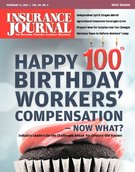Editor’s Note: This is the first of a two-part article on compliance with the Nonadmitted and Reinsurance Reform Act.
The Nonadmitted and Reinsurance Reform Act (NRRA), Subtitle B, Part I, Dodd-Frank Wall Street Reform and Consumer Protection Act, will usher in a new era of premium taxation and regulation for surplus lines insurance on July 21, 2011, an otherwise innocuous Thursday shortly after the Fourth of July,
The NRRA preempts (i.e., overrides) inconsistent state laws to (a) establish a uniform system for taxation of surplus lines premium, (b) establish uniform capital and surplus eligibility standards for surplus lines insurers, and (c) streamline other aspects of surplus lines regulation.
The principal feature of the NRRA is the concept of “Home State.” Only the Home State may tax surplus lines premium and regulate the insurance transaction. Surplus lines brokers will remit surplus lines premium tax only to the Home State and need comply only with the Home State’s premium tax and regulatory requirements. The days of surplus lines brokers having to deal with conflicting state laws and premium tax allocation methods for multistate placements will soon be history.
The NRRA leaves to the states to work out arrangements for allocating premium taxes among themselves — if they are able to do so. The states are actively pursuing possible creation of an interstate compact, clearinghouse or other method to ensure that each receives its “appropriate” share of surplus lines premium tax. This is an ongoing process that presently does not appear destined for an early conclusion. The National Conference of Insurance Legislators (NCOIL), the Council of State Governments (CSG), and the National Conference of State Legislators (NCSL) also have asked Congress to delay NRRA implementation until July 21, 2012, which industry opposes.
With these balls firmly in mid-air, the reality is that the NRRA goes live at 12:01 a.m. on Thursday, July 21, 2011, in the time zone of your choice. There is no transition period.
Be Prepared
The NRRA has significant ramifications for surplus lines broker accounting and production management systems, staff training, forms, filing procedures, internal controls and vetting of market security.
Accounting — Consider a July 20, 2011, cutoff date so that on and after July 21, 2011, premium tax is paid only to the Home State. Trying to recover surplus lines premium tax paid to the wrong state can lead to hypertension.
Training — Surplus lines brokers and key staff need to be seriously familiar with the NRRA definition of Home State, especially as applied to Affiliated Groups.
Forms and Procedures — The NRRA requires a special disclosure to Exempt Commercial Purchasers and a written request from the insurance buyer to procure the subject insurance from the nonadmitted market. Each insured should be required to confirm in writing its, his or her principal place of business or residence (e.g., in the insurance application).
For multistate risks, the NRRA eliminates the need to provide differing state surplus lines disclosures; only the Home State’s surplus lines disclosure form is required.
Do not destroy the other states’ forms. They will be needed when those states are the Home State for other transactions; so much for regulatory streamlining.
Regulatory Compliance — Are existing systems and procedures adequate to ensure correct identification of the Home State and compliance with Home State regulatory requirements? Beware: the definition of Home State offers traps for the unwary.
Security — NRRA preemption establishes uniform surplus lines insurer minimum capital and surplus eligibility requirements that are independent of state-approved eligibility lists such as California’s LESLI (List of Eligible Surplus Lines Insurers). For insurers that do not appear on the Home State’s approved list, surplus lines brokers may wish to consider augmenting their security measures.
Premium Tax — To implement the NRRA’s Home State taxation system, most if not all states are considering legislation that will tax 100 percent of surplus lines premium when they are the Home State. (See “Multi-State Surplus Lines Tax: State Inaction Risks Loss of Surplus Lines Premium Tax Revenue,” in Insurance Journal’s West Region Jan. 10, 2011 issue, page 20). Some pending state legislation (e.g., Washington) also includes provisions designed to implement other aspects of the NRRA.
Surplus lines brokers should be alert during 2011 to possible last-minute changes in Home State premium tax and other surplus lines laws, particularly any post-July 21 legislation that would tax 100 percent of surplus lines premium effective retroactively to July 21, 2011.
If the Home State appears to be taxing less than 100 percent of the premium, that would be a very good reason to check whether the Home State recently updated its premium tax laws. Otherwise the surplus lines broker risks under-collecting premium tax from the insured.
Compliance
With appropriate planning, NRRA compliance should not be difficult.
- Correctly identify the Home State at the outset.
- Be licensed by the Home State.
- Determine whether the insured is an Exempt Commercial Purchaser, therefore exempt from diligent search requirements, and provide required NRRA disclosures. If the Section 525 disclosure and written request from the insured are overlooked, Home State diligent search requirements will apply.
- Verify surplus lines insurer capital and surplus eligibility.
- Comply with Home State surplus lines filing and premium tax requirements. No filings need be made with any state but the Home State for a given surplus lines policy.
May your summer vacation be relaxing, enjoyable, and free of unpleasant NRRA compliance surprises.
Topics Agencies Legislation Excess Surplus
Was this article valuable?
Here are more articles you may enjoy.


 Former Broker, Co-Defendant Sentenced to 20 Years in Fraudulent ACA Sign-Ups
Former Broker, Co-Defendant Sentenced to 20 Years in Fraudulent ACA Sign-Ups  Viewpoint: Runoff Specialists Have Evolved Into Key Strategic Partners for Insurers
Viewpoint: Runoff Specialists Have Evolved Into Key Strategic Partners for Insurers  AIG’s Zaffino: Outcomes From AI Use Went From ‘Aspirational’ to ‘Beyond Expectations’
AIG’s Zaffino: Outcomes From AI Use Went From ‘Aspirational’ to ‘Beyond Expectations’  Lemonade Books Q4 Net Loss of $21.7M as Customer Count Grows
Lemonade Books Q4 Net Loss of $21.7M as Customer Count Grows 



